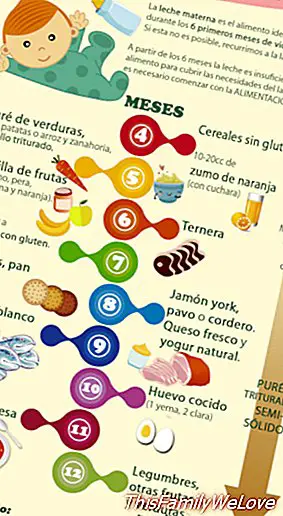Table of introduction of food in the baby
The feeding of the baby throughout its first year of life is very special. It consists of different stages, which are related to their age and the foods that must be tested and tolerated in each of them. This paused and prescribed way of introducing food into the baby's diet is the way to prevent allergies or intolerances.
Baby food introduction guide
Up to 6 months the baby has enough with breast milk or artificial milk. From then on, only the milk will be insufficient and the baby has to start with complementary feeding. Following the recommendations of the WHO and the experts in Nutrition of the AEP (Spanish Association of Pediatrics) ensures a good adaptation of the baby to adult feeding.
The fact that the start of complementary feeding is between 4 and 6 months, never before or after, is a matter of needs and preparation of the baby. The newborn and the 4-month-old baby are not prepared to digest food and their psychomotor development prevents certain functions necessary to feed on solids. In this Guide for Infant Feeding You can find graphically how to complete the period of breastfeeding the baby from 4 months to their first year, following the advice of the pediatrician Nisa Pardo de Aravaca Hospital, Mª Jesús Pascual.

This graphic table facilitates the mothers' consultation about the introduction of food in the baby's diet up to 18 months.
Foods that are introduced into the baby's diet before the first year
The new food groups have to be separated between 10 and 15 days to check the tolerance of the baby and to delay after the year the allergenic foods such as blue fish, and at 3 years the nuts.
Gluten-free cereals
After 6 months, some babies need a higher intake of iron and zinc in their diet and that is when we should start with gluten-free cereals. WHO recommends introducing fruits, gluten-free cereals or vegetables interchangeably. However, most pediatricians advise starting with gluten-free cereals or fruits, which are more digestive, and then continue with vegetables, which, because of their fiber and oxalate content, are more difficult to digest.
Cereals with gluten
Until recently, and according to the criteria of each pediatrician, cereals with gluten were not recommended until 8 or 9 months of age. Now the Espghan, the Spanish Association of Pediatrics and the AEDN advise that around the 7 months are introduced in small quantities cereals with gluten to avoid triggering a celiac disease in susceptible babies.
meats
After six months you can start introducing chicken, turkey and rabbit meat to the baby's diet.
1. The chicken It has a mild flavor and a low content of fat and cholesterol. The breast and the thigh are the leanest parts.
2. The turkey It is very similar to chicken in terms of fat content and cholesterol and the most lean part is the breast.
3. The rabbit it is the meat with less cholesterol and purines, and it is very digestive.
Once the tolerance to white meats (chicken, turkey and rabbit) has been verified, red meats such as lamb and kid or veal and pork can be incorporated.
Vegetables
- To start after 6 months: green beans, zucchini, squash, potato and sweet potato. They should be introduced one by one to know, in case of allergy, which vegetable produces it. Onions and leeks can cause gas and should be introduced with caution
- After 12 months: spinach, Swiss chard, cabbage, parsnips, asparagus, turnips, beetroot and celery. Some contain a high contribution of oxalates and nitrites are not suitable until 12 months.
The carrots, Because of their high level of nitrites, they must wait until 9 months. However, they can be offered after 6 months in a small amount and always discarding the cooking water.
The tomatoes They are one of the most allergenic vegetables, although many consider them a fruit because they have seeds. It is detected by the eruptions it causes around the mouth. It can be introduced after 6-7 months or wait until 9-12 months.
Fruits
The first fruits should be introduced into the baby's diet starting at 6 months if the baby is breastfeeding, and from 4 to 6 months if you take formula.
- After six months: banana, pear, apple and orange. These are the 4 ingredients of the first fruit porridges.
- After 12 months: kiwi, mango, pineapple, papaya, melon, watermelon .... It can also be offered after 6 months, but if there is a history of allergy, it is preferable to start at 12 months.
Peach and apricots they must wait until 12 months and Red fruits (like strawberries, blackberries, raspberries ...) NEVER before the year and ALWAYS better wait at 18 months), since they are potentially allergenic.
White fish
The Breastfeeding Committee of the AEP (Spanish Association of Pediatrics) recommends the introduction of fish after the ninth month.
However, for babies with allergies or at high risk of suffering from it, the AESAN (Spanish Agency for Food Safety and Nutrition) recommends waiting for three years, always leaving cod and hake for the end, which are the most allergies provoke.
Eggs
Because it is susceptible to cause allergies, the egg must be introduced in parts. At 9 months and a half we can start to introduce the egg into the baby's diet, although egg white should not be offered until 12 months, starting by introducing half a yolk in the vegetable puree and only once a week .
The eggs should be boiled, never raw because of the risk of salmonellosis and the correct way to boil them is as follows: they should be placed in cold water and count exactly 8 minutes since the water starts to boil to avoid the overcooking of the yolk. that the egg has an unpleasant smell and taste.
When the baby has taken the first 4 purees, the whole yolk can be introduced twice a week.
Marisol Nuevo Espín




